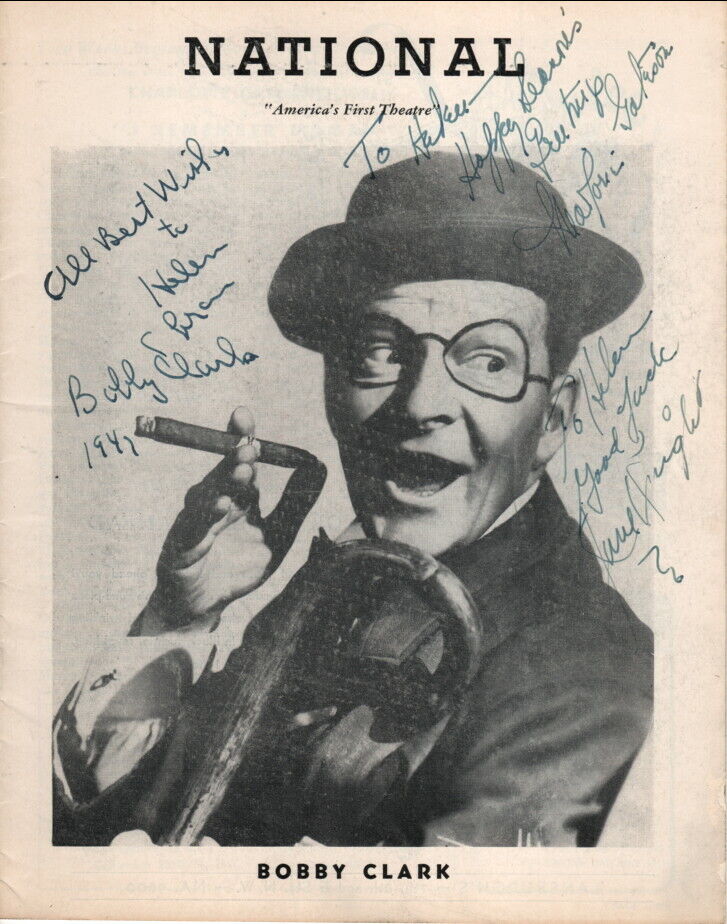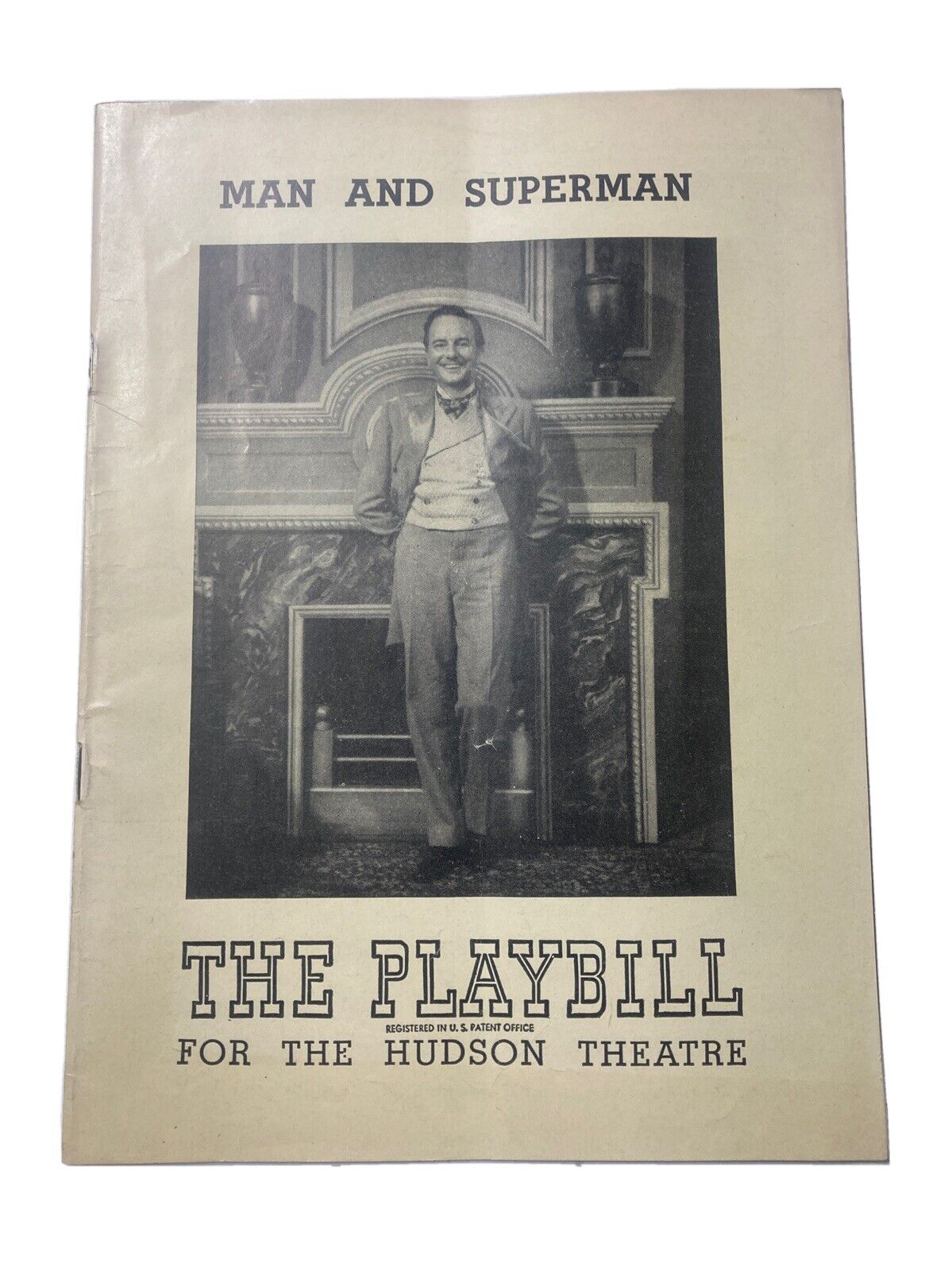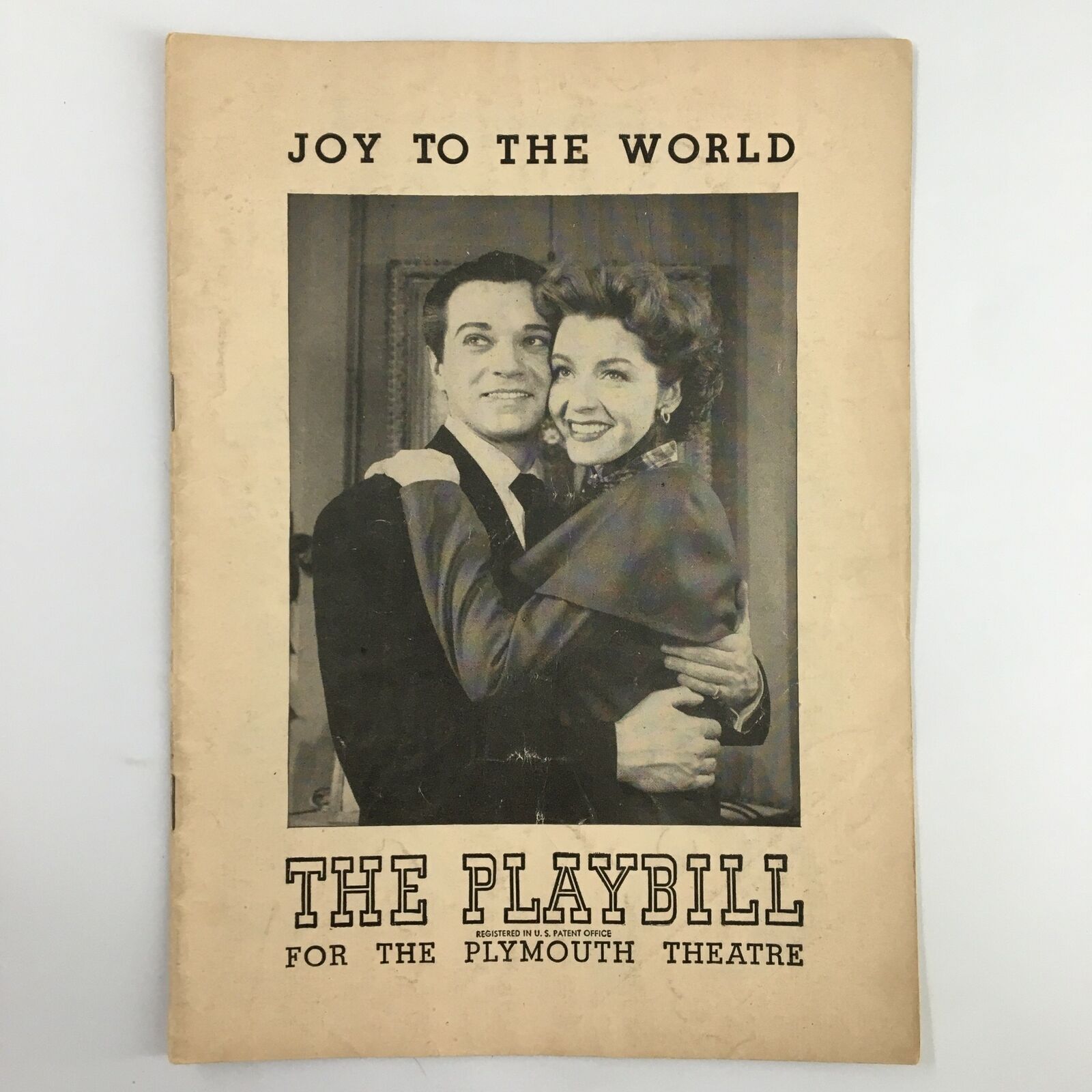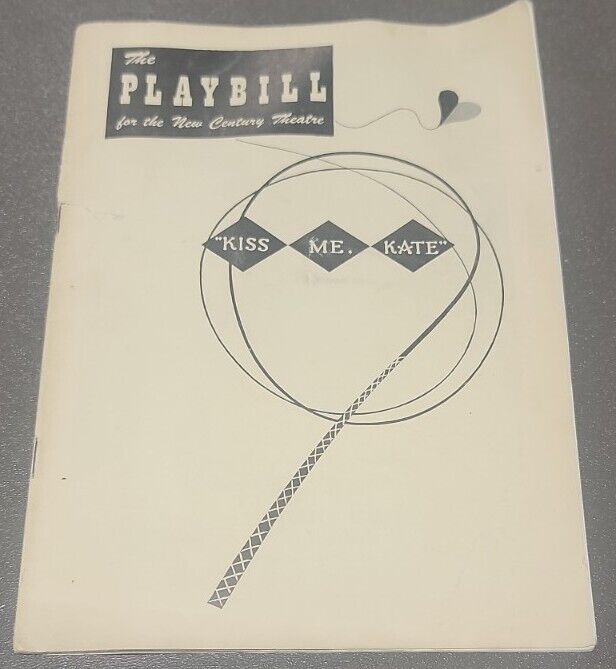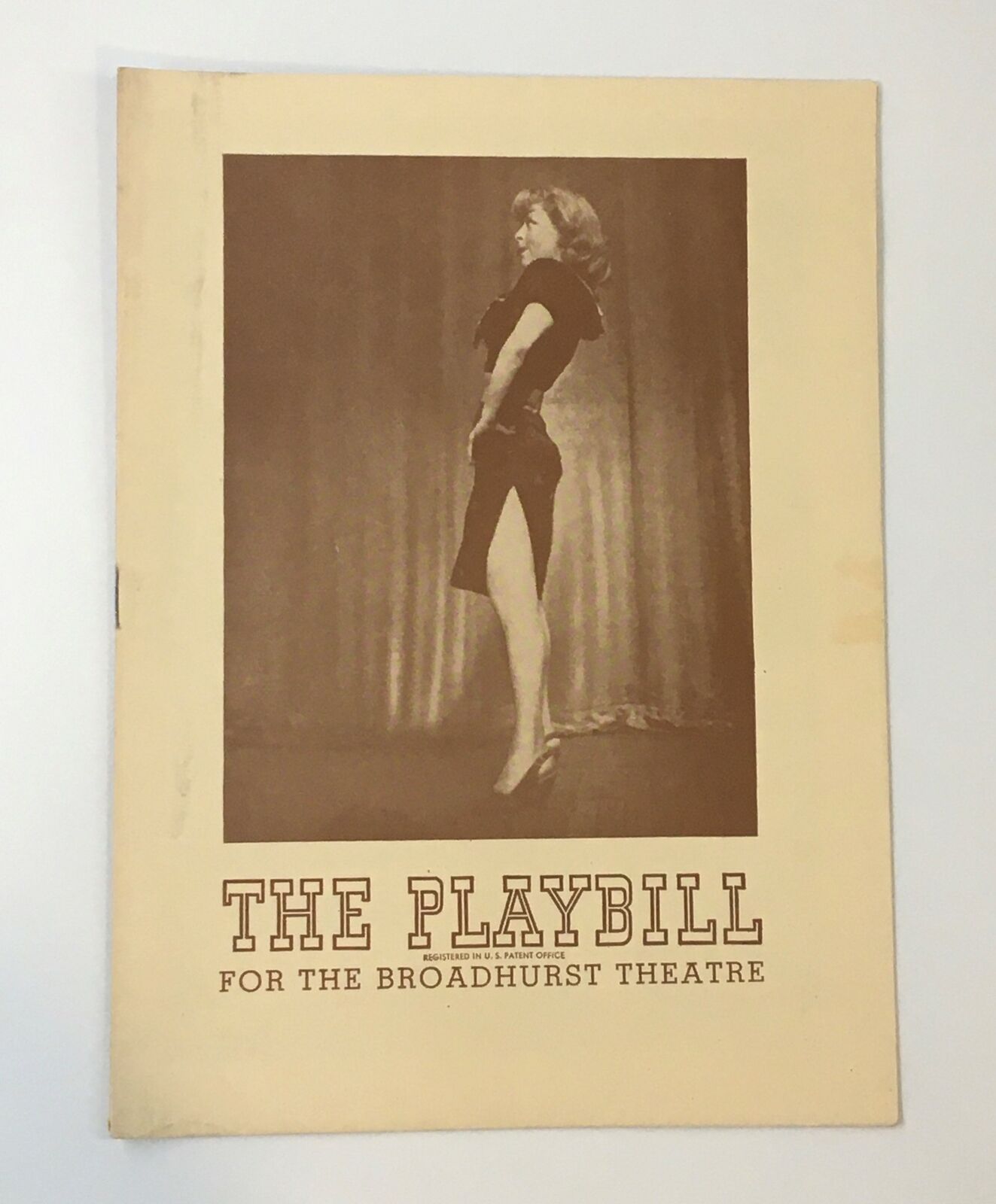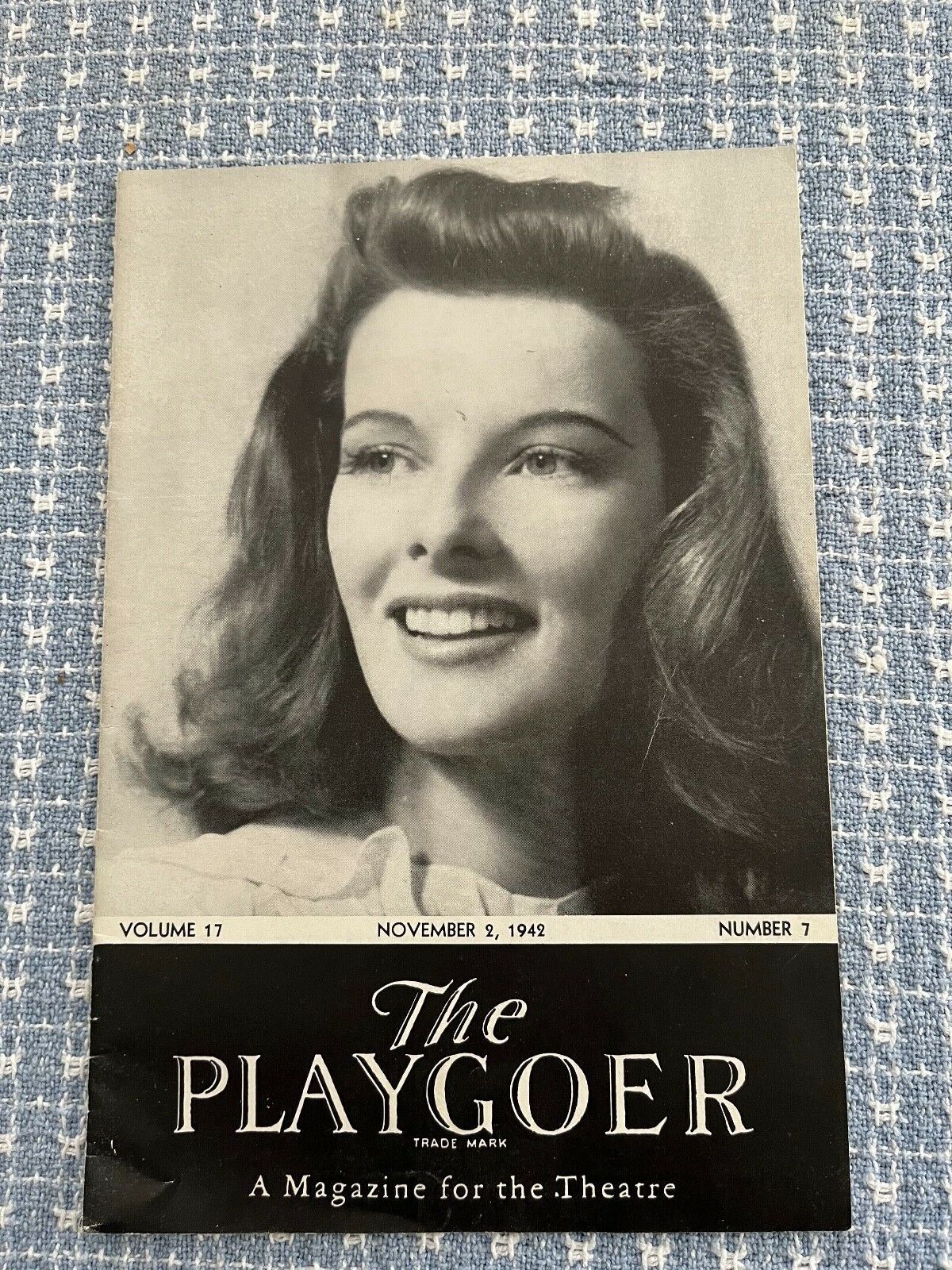-40%
Bobby Clark, Marjorie Gateson & June Knight Autographs, "Sweethearts" 1947
$ 27.45
- Description
- Size Guide
Description
About the Autograph Collection. My Aunt Helen spent years collecting autographs during her tenure at The National Theater in Washington DC. She began her tenure in 1932 until her retirement in the mid 1980's due to an Auto Accident.Most of the collection spans the 1940's, 50's with some autographs from the 60's and 70's. Some of the Autographs Collection was recently sold to
Tamino Autographs in New York.
I will be listing more from this fairly large collection over the next few weeks.
Bobby Clark, Marjorie Gateson & June Knight Autographs, "Sweethearts" 1947
Robert Edwin Clark (June 16, 1888 – February 12, 1960)
, known as Bobby Clark, was a minstrel, vaudevillian, performer on stage, film, television and the circus. Known for his painted-on eyeglasses, he was part of a comedy team with Paul McCullough for 36 years.
Early years: He was born in Springfield, Ohio. While still in grammar school he formed a friendship with classmate Paul McCullough. The two attended tumbling classes, and began performing an acrobatic act in minstrel shows and later in the Ringling Brothers' Circus. The team worked as clowns from 1906 to 1912. In 1912 they made their debut in vaudeville with a pantomime act built around the simple act of placing a chair on top of a table. In 1922 they starred in Irving Berlin's Broadway show Music Box Revue.
Film career: Beginning in 1929, they made a series of about 35 short comedy films, for FOX and RKO, some of which are still extant. Clark & McCullough performed together until McCullough's suicide in March 1936. In 1939 Clark appeared on Broadway in The Streets of Paris, sharing the stage with a new comedy act: Abbott & Costello. Clark appeared on television during the 1950–51 television season, in the 8–9 pm Sunday night time slot of The Colgate Comedy Hour; however, Clark's four episodes were among those sponsored by Frigidaire and titled simply The Comedy Hour. The Goldwyn Follies, his last and only film without Paul McCullough, in 1938, was the first Technicolor film produced by Samuel Goldwyn. The Clark & McCullough shorts were made for an adult audience, with Clark writing much of the dialogue. Like Wheeler & Woolsey’s films, they were not released for television, being considered too vulgar. So, they did not enjoy the renaissance of popularity with a new generation, on television, like The Three Stooges, or Laurel & Hardy.
Stage work: He appeared on Broadway in the Ziegfeld Follies of 1936. His reputation grew as he tackled roles in plays such as Sheridan's The Rivals, as well as in musical comedies and revues. Starting in 1942, producer Mike Todd cast him in five Broadway shows, all of them successful: the musical revue Star and Garter with Gypsy Rose Lee (1942–43); the Cole Porter musical Mexican Hayride (1944–45); Molière’s The Would-Be Gentleman (1946); and the revues As the Girls Go (1948) and Michael Todd's Peep Show (1950). He came out of retirement to tour with Damn Yankees, 1956–58, in the role created on Broadway by Ray Walston. As well as his better-known stage and film credits, Clark directed and appeared in such Restoration comedy as Congreve's Love For Love, and lectured on this period of theatre at the American Theater Wing. Bobby Clark died in New York City in 1960.
Marjorie Augusta Gateson (January 17, 1891 – April 17, 1977, was an American stage and film actress.
Gateson was born in Brooklyn, New York, to Augusta and Daniel Gateson. Her maternal grandfather and brother were clergymen; Some sources state her father was one too, but Axel Nissen in his book Mothers, Mammies and Old Maids: Twenty-Five Character Actresses of Golden Age Hollywood writes that he was a contractor. She attended the Packer Collegiate Institute and the Brooklyn Conservatory of Music, the latter being where her mother taught elocution. She believed her mother had "an inner longing for the stage", which she passed on to Marjorie, along with diction and poise. Gateson's musical schooling came in handy, helping her land a job in the chorus in a play called The Pink Lady. She made her Broadway debut at the age of 21 in a short-lived musical called The Dove of Peace on November 4, 1912; the show closed after 12 performances. During the much longer run of her next Broadway play, The Little Cafe (November 12, 1913 – March 14, 1914), she played several of the characters. In 1917's Broadway musical Have a Heart, she got to sing a couple of songs. She performed in a steady diet of musical comedies for another decade, ending with Oh, Ernest! (1927), but also appeared in non-musical comedies and dramas. After the Broadway comedy As Good as New in 1930, she set out for Hollywood. Gateson made her film debut in 1931, after more than two decades on the stage, playing secondary character roles as women of wealth and breeding, who were often haughty and aloof. She is perhaps best known as the society matron who attempts to thwart Mae West's character's plans for social climbing in the 1935 film Goin' to Town, and as a rather kinder socialite whom Harold Lloyd teaches to box in 1936's The Milky Way. Other films in which she appeared include The King's Vacation (1933) (her largest role, the female lead opposite George Arliss), Bureau of Missing Persons (1933), Private Number (1936), You'll Never Get Rich (1941), International Lady (1941), and Meet The Stewarts (1942). Her film work petered out in the late 1940s and she jumped into television roles. She made her small screen debut in 1949. She was featured in the 1949 television soap opera One Man's Family and found success in 1954 at age 63 playing matriarch Grace Harris Tyrell on the daytime soap The Secret Storm, a role she would play until 1968. Gateson also made numerous other television appearances in the 1950s, including episodes of Hallmark Hall of Fame, Robert Montgomery Presents, and United States Steel Hour.
Street of Women (1932) - The King's Vacation (1933)- Employees' Entrance (1933)- Walls of Gold (1933)-Cocktail Hour (1933) -Melody Cruise (1933) - Blind Adventure (1933)- Bureau of Missing Persons (1933)- Fog (1933) - The World Changes (1933)- Lady Killer (1933) - Let's Fall in Love (1933)- Hi, Nellie! (1934)- Operator 13 (1934)- Down to Their Last Yacht (1934)- Chained (1934) Big Hearted Herbert (1934) - Happiness Ahead (1934) - Gentlemen Are Born (1934)- Goin' to Town (1935) - His Family Tree (1935)- The Milky Way (1936)- Wife vs. Secretary (1936) - Big Brown Eyes (1936)- Private Number (1936)- Vogues of 1938 (1937)- First Lady (1937)- Stablemates (1938)- Making the Headlines (1938)- Spring Madness (1938)- The Duke of West Point (1938)- Geronimo (1939)- 'Til We Meet Again (1940)- Pop Always Pays (1940)- In Old Missouri (1940)- Back Street (1941)- Honolulu Lu (1941)- You'll Never Get Rich (1941)- International Lady (1941)- Passage from Hong Kong (1941)- Meet the Stewarts (1942)- Obliging Young Lady (1942)- Rings on Her Fingers (1942)- Meet the Stewarts (1942)- Juke Box Jenny (1942)- No Time for Love (1943)- The Youngest Profession (1943)- The Sky's the Limit (1943)- I Dood It (1943)- Ever Since Venus (1944)- Seven Days Ashore (1944)- One More Tomorrow (1946)- The Caddy (1953)
June Knight (born Margaret Rose Valliquietto; January 22, 1913 – June 16, 1987)
was an American Broadway and film actress and singer.
Knight was born in Los Angeles in 1913. During the first years of her life, she was in very poor health. She suffered from tuberculosis when she was 4 years old and doctors told her parents that there was a strong chance that she would not live to maturity. Due to infantile paralysis, she could not walk till she was five years old.[citation needed] When she was 10 years old, she started to sing and dance in public.
Career: Dancer John Holland changed her name to June Knight when she became his partner, assigning her the same name as that of his previous partner. That change led to a court case in 1940, when the actress June Knight filed suit against the original dancer with that name. The actress said that she had made the name famous and that the dancer had previously agreed to stop using that name. At age 19, she appeared in the last Ziegfeld Follies show, Hot-Cha! (1932). She was featured in four other Broadway shows, Take A Chance (1932), Jubilee (1935) (where she introduced the Cole Porter classic "Begin the Beguine"), The Would-Be Gentleman (1946) (her only non-musical) and Sweethearts (1947).
She also had a short-lived film career, appearing in 12 films from 1930 to 1940, most notably in Broadway Melody of 1936 (1935), in which she sang the hit song "I've Got a Feelin' You're Foolin'" with co-star Robert Taylor.
Personal life and death: Knight married four times, including a marriage to oil man Arthur A. Cameron. She died in 1987, age 74, due to complications from a stroke; she was interred in Pierce Brothers Valhalla Memorial Park.
Recognition: For her contribution to the motion picture industry, June Knight has a star on the Hollywood Walk of Fame at 6247 Hollywood Boulevard.
